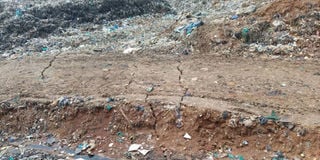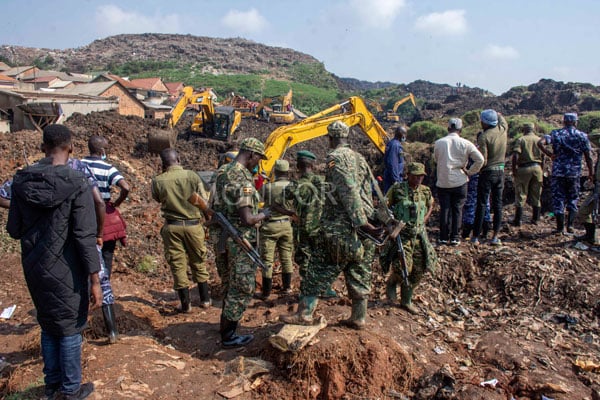Lukwago to Museveni: Kampala is sinking, act now

Cracks spread across Kitezi landfill, raising environmental concerns. Photo/Busein Samilu
What you need to know:
Unveiling his intervention plan for the short, medium, and long term, Lukwago criticized the delay in addressing the situation after the country’s only landfill, which has been operational for 28 years, collapsed last week
Kampala Lord Mayor Elias Lukwago has urged President Museveni to use the upcoming Monday Cabinet meeting to make critical decisions that will save the city from its current crisis. Lukwago emphasized the need for immediate action to prevent Kampala from further deterioration following the collapse of the Kiteezi landfill, which has left the city drowning in garbage.
Unveiling his intervention plan for the short, medium, and long term, Lukwago criticized the delay in addressing the situation after the country’s only landfill, which has been operational for 28 years, collapsed last week. He urged the president to act swiftly to prevent further disaster.
“Release funds from the contingency fund or any other emergency reserve to flatten the remaining mountains of garbage at Kiteezi and avert another episode of garbage slides. Our technical team has already alerted us to the imminent danger due to visible cracks,” Lukwago said.
Police confirmed they have retrieved 35 bodies from the debris, with over 14 people injured and properties worth millions destroyed. The city has been grappling with garbage accumulation since Saturday, as the Kampala Capital City Authority (KCCA) struggles to secure a new landfill after being denied access to temporary dumpsites in Mukono, Wakiso, and Nkumba.
Lukwago called on the president to direct immediate funding for emergency operations and to meet the demands of Nkumba officials, who are allowing KCCA temporary access to their site under certain conditions. These include grading roads, providing water browsers to control dust, deploying excavators, constructing a soak pit for leachate absorption, and building a concrete embankment to prevent contamination of nearby water bodies.
Lukwago also called for an investigation into the mismanagement of funds meant for the maintenance of the Kiteezi landfill, specifically the Shs4.18 billion annual allocation.
Kampala is currently overwhelmed by uncollected garbage, which health experts warn could lead to outbreaks of diseases such as cholera, dysentery, and diarrhea. The collapse of the Kiteezi landfill, which has been operational since 1996, buried more than 100 houses across the villages of Kiteezi, Kitetika, and Lusanja.
Some residents believe the collapse was triggered by the installation of pipes by unidentified Chinese investors, though this claim could not be independently verified.
A visit to the site by the Sunday Monitor revealed the scale of the catastrophe, with the debris spread over a distance of eight to ten kilometers. Excavators are working tirelessly to retrieve missing bodies, but locals fear many of their friends and family members are still buried under the rubble.
Kampala Metropolitan Police confirmed that additional excavators are being deployed to speed up the recovery process. Disaster Preparedness State Minister Lilian Aber confirmed that more than 100 houses were covered in the collapse, while locals fear the number could be even higher.
Despite the tragedy, some residents continue to sort garbage illegally at the site, putting themselves at further risk. Many of those who used to work there are missing, with one resident estimating that 80 of his colleagues may have perished in the collapse.




